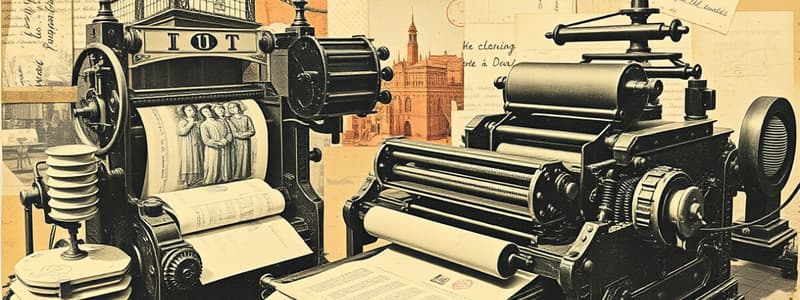Podcast
Questions and Answers
What invention during the Renaissance revolutionized communication and idea sharing?
What invention during the Renaissance revolutionized communication and idea sharing?
- Writing Desk
- Telegraph
- Printing Press (correct)
- Typewriter
Who developed the movable type printing press around 1450?
Who developed the movable type printing press around 1450?
- Nicolaus Copernicus
- Leonardo da Vinci
- Martin Luther
- Johannes Gutenberg (correct)
Which of the following sacraments was NOT deemed necessary for salvation by the Catholic Church?
Which of the following sacraments was NOT deemed necessary for salvation by the Catholic Church?
- Holy Orders (correct)
- Eucharist
- Reconciliation
- Baptism
What event was sparked by the distribution of Martin Luther's Ninety-Five Theses?
What event was sparked by the distribution of Martin Luther's Ninety-Five Theses?
What was a consequence of the printing press making books more affordable?
What was a consequence of the printing press making books more affordable?
What was the primary objection that Martin Luther raised against the Catholic Church?
What was the primary objection that Martin Luther raised against the Catholic Church?
Which event is considered the starting point of the Protestant Reformation?
Which event is considered the starting point of the Protestant Reformation?
Who was a prominent Protestant reformer alongside Martin Luther?
Who was a prominent Protestant reformer alongside Martin Luther?
What was one of the main purposes of the Council of Trent?
What was one of the main purposes of the Council of Trent?
What did members of the Protestant faith particularly contest regarding Catholic practices?
What did members of the Protestant faith particularly contest regarding Catholic practices?
Flashcards are hidden until you start studying
Study Notes
Communications Revolution of the Renaissance
- The Renaissance marked a significant shift in social and technological innovation in Europe, leading to a communications revolution.
- Johannes Gutenberg invented the movable type printing press around 1450, which allowed for faster print production.
- The printing press made books more affordable, fostering a new intellectual culture that emphasized education and idea sharing.
- The spread of ideas through printed materials significantly altered societal structures and facilitated movements like the Protestant Reformation.
Influence of the Catholic Church Prior to the Reformation
- By 1500 C.E., the Roman Catholic Church dominated religion in Western Europe.
- The Church taught that receiving sacraments and performing good works were essential for salvation.
- Seven sacraments were recognized, with particularly critical ones including Baptism, Confirmation, Eucharist, Reconciliation, and Anointing the Sick.
- Control over sacramental distribution gave the Church immense power, leading to a lack of challenges to its authority at that time.
Martin Luther and the 95 Theses
- The 95 Theses were published by Martin Luther in Wittenberg, Germany, in 1517, challenging Catholic Church practices.
- Luther opposed the sale of indulgences and posited that faith in Jesus alone could ensure salvation.
- He faced trial at the Diet of Worms, where he denied heretical accusations and was condemned by Holy Roman Emperor Charles V.
- Luther's translation of the Bible into German allowed broader access and understanding, laying groundwork for Protestantism and Lutheranism.
Emergence of the Protestant Reformation
- The Protestant Reformation began in 1517 with Luther's Ninety-Five Theses, leading to a significant religious shift, primarily in Northern Europe.
- John Calvin emerged as another key reformer, founding Calvinism, which stressed predestination and found strong support in places like Switzerland and Scotland (Presbyterianism).
- The printing press facilitated the rapid spread of Reformation ideas, while Southern Europe remained predominantly Catholic.
Growing Support for Protestantism
- The Reformation gained momentum in response to corruption within the Catholic Church, attracting many Europeans.
- Ulrich Zwingli became a major leader in Switzerland, promoting Protestant beliefs alongside Luther's principles.
Key Terms of the Reformation
- Ulrich Zwingli led the Swiss Reformation, emphasizing reform in religious practices.
- Huguenot refers to the French Protestants during the Reformation Era.
- The St. Bartholomew's Day Massacre (August 1572) involved the killing of thousands of Huguenots by Catholics.
- The Church of England established itself as a separate Protestant denomination from Catholicism in 1534.
- Plymouth Colony, founded in 1620 by religious dissenters, symbolized the search for religious freedom.
The Counter-Reformation and the Council of Trent
- The Council of Trent, called to address the Protestant Reformation, aimed to reaffirm Catholic doctrine and correct Church corruption.
- The Counter-Reformation was a response to Protestantism, incorporating reforms inspired by criticisms from reformers.
- The council increased clergy education and discipline while addressing the sale of indulgences, which was abolished.
- Traditional Catholic practices such as the veneration of saints and the importance of sacraments remained firmly in place after the council's reforms.
Studying That Suits You
Use AI to generate personalized quizzes and flashcards to suit your learning preferences.




